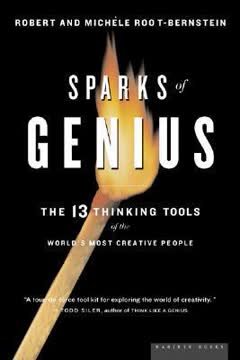Key Takeaways
1. Creativity's Secret: It Starts Before Words or Logic.
The words of the language, as they are written or spoken, do not seem to play any role in my mechanism of thought.
Ideas are born preverbally. Creative thinking across all fields, from science to art, originates in a realm beyond language and formal logic. It manifests through emotions, intuitions, images
[ERROR: Incomplete response]
Last updated:
FAQ
1. What is Sparks of Genius by Robert and Michèle Root-Bernstein about?
- Universal creative process: The book explores how creativity is a universal process that transcends disciplines, involving emotions, intuition, images, and bodily sensations before formal expression.
- Thirteen thinking tools: It identifies and explains thirteen general-purpose thinking tools used by the world’s most creative people, showing their application across arts, sciences, and everyday life.
- Interdisciplinary integration: The authors emphasize the surprising connections between sciences, arts, humanities, and technology, arguing that creative imagination operates similarly in all fields.
- Educational reform: The book advocates for restructuring education to teach these thinking tools, fostering lifelong learners and innovative thinkers.
2. Why should I read Sparks of Genius by Robert and Michèle Root-Bernstein?
- Demystifies creativity: The book reveals that creativity is not an innate gift but a set of learnable skills, making it accessible to everyone.
- Practical self-improvement: Readers can develop their own creative abilities by understanding and practicing the thirteen thinking tools, enhancing problem-solving and innovation.
- Challenges educational norms: It critiques traditional education for neglecting nonverbal and intuitive thinking, offering a vision for more holistic and effective learning.
- Inspiration from real examples: The book draws on introspective reports from figures like Einstein, Picasso, and McClintock, illustrating how creative thinking operates in practice.
3. What are the key takeaways from Sparks of Genius by Robert and Michèle Root-Bernstein?
- Creativity is universal: Creative thinking tools are shared across disciplines and can be cultivated by anyone, not just artists or scientists.
- Thirteen thinking tools: Mastery of tools like observing, imaging, abstracting, analogizing, and synthesizing is essential for innovation and problem-solving.
- Integration over specialization: The book argues for breaking down disciplinary silos in education and thinking, promoting synthetic understanding.
- Practical exercises: It provides hands-on activities and real-world examples to help readers develop and apply these tools in their own lives.
4. What are the thirteen thinking tools described in Sparks of Genius by Robert and Michèle Root-Bernstein?
- Core tools: Observing, imaging, abstracting, recognizing patterns, forming patterns, analogizing, body thinking, empathizing, dimensional thinking, modeling, playing, transforming, and synthesizing.
- Interconnectedness: These tools are often used together, with higher-order tools like synthesizing integrating the others for holistic understanding.
- Cross-disciplinary relevance: Each tool is illustrated with examples from arts, sciences, and everyday life, showing their universal applicability.
- Foundation for innovation: Mastery of these tools enables flexible, creative problem-solving and the ability to express ideas in multiple forms.
5. How does Sparks of Genius by Robert and Michèle Root-Bernstein define and explain "Observing" as a thinking tool?
- Active perception: Observing goes beyond passive seeing, requiring patience, attention, and engagement of all senses to notice subtle details and patterns.
- Training the senses: Great observers like Georgia O’Keeffe and Sherlock Holmes developed their skills through deliberate practice and sensory exercises.
- Foundational skill: Observation is crucial in arts, sciences, literature, and medicine, enabling accurate perception and deeper understanding.
- Practical exercises: The book suggests activities like blindfolded touch identification and detailed note-taking to enhance observational abilities.
6. What is "Imaging" in Sparks of Genius by Robert and Michèle Root-Bernstein, and how is it used?
- Mental visualization: Imaging involves creating or recalling sensory images in the mind, allowing thinkers to manipulate ideas without physical presence.
- Varied abilities: People differ in their imaging skills—some visualize with eyes open or closed, others need to draw or hum to access mental images.
- Role in creativity: Inventors, composers, and writers use imaging to develop complex ideas, such as Tesla visualizing machines or Beethoven hearing symphonies internally.
- Learnable and essential: Imaging can be improved through practice and is vital for translating abstract concepts into concrete understanding.
7. How does Sparks of Genius by Robert and Michèle Root-Bernstein describe "Abstracting" and its importance?
- Essence extraction: Abstracting means focusing on key features of an object or idea, simplifying complexity to reveal fundamental truths.
- Cross-disciplinary examples: Artists like Picasso, scientists like Wilson, and poets like cummings use abstraction to communicate essential patterns or concepts.
- Skillful process: Abstraction requires repeated refinement and is foundational in mathematics, science, art, and literature.
- Universal application: Mastery of abstraction enables creators to find common principles and express complex ideas succinctly.
8. What is the role of "Pattern Recognition" and "Pattern Forming" in creativity according to Sparks of Genius by Robert and Michèle Root-Bernstein?
- Pattern recognition: This tool allows humans to organize sensory input, predict outcomes, and form expectations, essential for understanding jokes, art, music, and science.
- Pattern forming: Involves creating new structures by combining simple elements, leading to complex and novel results in art, music, mathematics, and science.
- Cultural and cross-modal: Pattern recognition and forming are shaped by cultural experience and can occur visually, aurally, verbally, and kinesthetically.
- Practice and innovation: The book encourages playful exploration and exercises to enhance these skills, emphasizing their importance in problem-solving and creativity.
9. How does Sparks of Genius by Robert and Michèle Root-Bernstein explain "Analogizing" as a creative tool?
- Functional resemblance: Analogizing involves recognizing inner relationships or functions between different phenomena, not just superficial similarities.
- Scientific and artistic breakthroughs: Major theories and creations, like Planck’s quantum theory or Escher’s art, often arise from powerful analogies.
- Learning and teaching: Analogies help bridge the known and unknown, making abstract or inaccessible concepts understandable.
- Nurturing analogical thinking: The book advocates for early and interdisciplinary education to develop this essential creative skill.
10. What are "Body Thinking" and "Empathizing" in Sparks of Genius by Robert and Michèle Root-Bernstein, and why are they important?
- Body thinking: Involves using proprioception, kinesthetic imagination, and visceral sensations to think and create, crucial for dancers, artists, scientists, and more.
- Beyond movement: Includes emotional and tactile sensations, and extends to imagining others’ bodily states or projecting sensations into tools.
- Empathizing: Means entering into the experience of others—people, animals, or even abstract entities—to gain deep understanding and insight.
- Learning empathy: Techniques like role-playing, literature, and imaginative play foster the ability to “become other,” enhancing creativity and problem-solving.
11. How does Sparks of Genius by Robert and Michèle Root-Bernstein define "Transforming" and "Synthesizing" as higher-order thinking tools?
- Transforming: Involves using multiple thinking tools serially or simultaneously, where one set acts upon another to generate new forms and ideas.
- Synthesizing: Represents the integration of multiple ways of knowing—sensation, feeling, memory, and rational thought—into unified understanding.
- Examples in action: The book illustrates these tools through real-world cases like Mary Leakey’s Laetoli footprints discovery and collaborative art projects.
- Educational value: Transformational and synthetic thinking foster flexible cognition, deep insight, and the ability to express solutions in diverse forms.
12. What educational reforms and practical exercises does Sparks of Genius by Robert and Michèle Root-Bernstein recommend to foster creativity?
- Shift to process-based learning: The authors advocate teaching universal processes of invention and active understanding, rather than passive fact acquisition.
- Integrated curriculum: They recommend placing arts on equal footing with sciences and using a common language of innovation to link subjects.
- Cultivating polymaths: Encouraging broad interests and resisting early specialization helps develop versatile, innovative thinkers.
- Hands-on activities: The book suggests mnemonic devices, multimodal projects, and programs like Odyssey of the Mind and River of Words to develop creative thinking tools.
Review Summary
Sparks of Genius receives mixed reviews, with an average rating of 3.89/5. Readers appreciate its insights on creativity, thinking tools, and the connection between art and science. Many find it thought-provoking and useful for educators. However, some criticize its dense writing style, lack of diversity in examples, and repetitiveness. The book's exploration of 13 thinking tools used by creative individuals is praised, but some readers struggle with its academic tone and organization. Overall, it's recommended for those interested in creativity and interdisciplinary thinking.
Similar Books
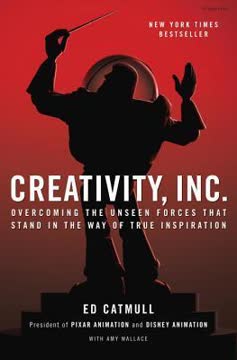
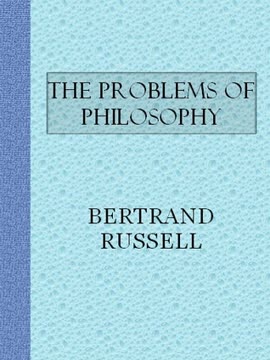
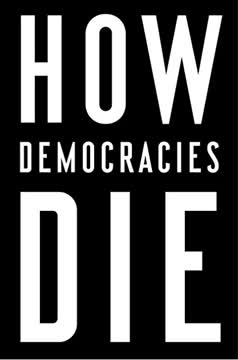
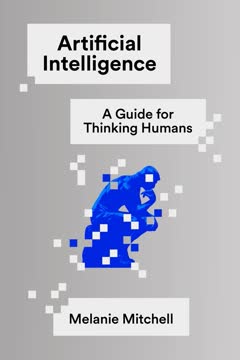
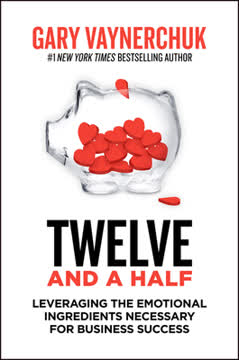
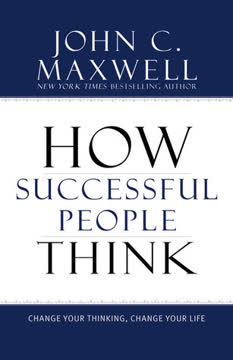

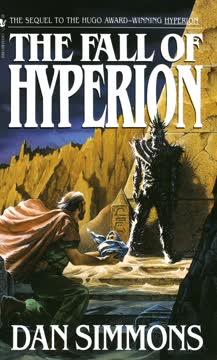
Download PDF
Download EPUB
.epub digital book format is ideal for reading ebooks on phones, tablets, and e-readers.
